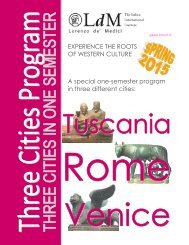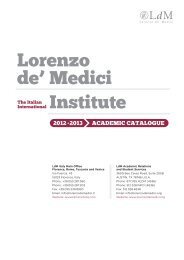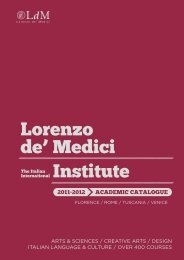aCademiC Catalog 2013-2014 - Lorenzo de Medici
aCademiC Catalog 2013-2014 - Lorenzo de Medici
aCademiC Catalog 2013-2014 - Lorenzo de Medici
You also want an ePaper? Increase the reach of your titles
YUMPU automatically turns print PDFs into web optimized ePapers that Google loves.
International Politics<br />
POL 288 F<br />
Cr: 3; Contact hrs: 45<br />
This course aims to introduce the basic concepts of International<br />
Politics and to get acquainted with the most important events<br />
in the world and the structure of international relations since<br />
the Peace of Westphalia (1648), outlining the main differences<br />
between the traditional inter-state system and the present<br />
global or<strong>de</strong>r, with the growing importance of international<br />
organizations and of the principles related to peace, <strong>de</strong>mocracy<br />
and human rights. This aims to give stu<strong>de</strong>nts a general<br />
overview and an un<strong>de</strong>rstanding of contemporary world politics,<br />
according with the i<strong>de</strong>a that international politics are not distant<br />
from ordinary people, but the contrary a matter that concerns<br />
and can be influenced by the citizens. It is therefore important<br />
that stu<strong>de</strong>nts are aware of what is happening around the world<br />
and of how the same event can be perceived differently by<br />
different peoples. In the first part of the course we will examine<br />
the importance of studying world politics and the methods to<br />
do it. We will also cover the difference between nationalism<br />
and globalization, and the growing emergence of international<br />
organizations. At the end of this part we will analyze the role<br />
of international law and diplomacy. In the second part we will<br />
focus on the globalization of economics by studying the main<br />
economic organizations and the process of regional integration.<br />
Special attention will be given to human rights protection and<br />
to international terrorism and the way it is affecting present<br />
international relationships.<br />
Prerequisites: POL 150 Introduction to Political Science, or<br />
equivalent<br />
International Conflict Resolution<br />
POL 292 F; Dual listed: PST 290 F<br />
Cr: 3; Contact hrs: 45<br />
The course presents concepts and theories related to the<br />
peaceful transformation of international violent conflicts,<br />
illustrating them with examples driven both from global peace<br />
initiatives and Italian experiences in the field. Approaches to<br />
International Conflict Resolution have become wi<strong>de</strong>ly used and<br />
discussed in the last <strong>de</strong>ca<strong>de</strong>. New roles and tasks have emerged<br />
for international organizations such as the United Nations and<br />
the OSCE. At the same time, civil society organizations have<br />
increasingly played an important role in conflict resolution,<br />
through “second-track” or citizens’ diplomacy, conflict sensitive<br />
approaches to <strong>de</strong>velopment, as well as third party nonviolent<br />
intervention. In Italy, several peace organizations have their<br />
roots in Christian Catholic values. The strong tradition of selfgovernment<br />
has also encouraged Municipalities and Regions to<br />
work on <strong>de</strong>velopment and peace issues. At the end of the course<br />
participants will have a clear un<strong>de</strong>rstanding of international<br />
conflict resolution and will have gained an insight into concrete<br />
examples both of global and Italian organizations.<br />
Mo<strong>de</strong>rn Italy<br />
POL 296 F; Dual listed: HIS 296 F<br />
Cr: 3; Contact hrs: 45<br />
The main goal of the course is for stu<strong>de</strong>nts to gain a general<br />
un<strong>de</strong>rstanding of the way Italian history and culture has<br />
<strong>de</strong>veloped in the last 50 years, especially in the arena of<br />
public policies and social interactions. The course will be<br />
loosely divi<strong>de</strong>d in three main segments. The first one, relying<br />
mainly on historical data and information, aims to provi<strong>de</strong> a<br />
general background about Italian politics and culture. In the<br />
second part, we will focus on the current changes that have<br />
occurred in Italy during the past 20 years, focusing especially<br />
on the breakdown of the traditional political system and on the<br />
<strong>de</strong>creased relevance of the Church in State and public matters.<br />
Finally, we will examine how the last 10 years – during which<br />
there has been a great transformation in the way media affects<br />
the distribution and spread of information – have brought an<br />
apparent, but possibly not real, upheaval in the way politics,<br />
culture and information are received and <strong>de</strong>bated among<br />
Italians.<br />
Prerequisites: an introductory course in History or Political<br />
Science<br />
War and Media<br />
POL 301 F; Dual listed: COM 301 F / PST 301 F<br />
Cr: 3; Contact hrs: 45<br />
This course analyses the role played by the media in the<br />
evolution of national and international wars. We will investigate<br />
the extent to which the media either influence <strong>de</strong>cision-making<br />
about military interventions or serve as tools in the hands of<br />
government officials seeking to influence public opinion. A<br />
number of media-related phenomena will be studied including<br />
the CNN effect, agenda setting, real time policy, media diplomacy,<br />
media war, news management and propaganda, through the<br />
examination of key international conflicts, especially since<br />
1950. Several different topics will be explained to un<strong>de</strong>rstand<br />
the intersection between war and media: the proliferation<br />
of satellite technologies and the internet; the importance of<br />
the international TV networks (like CNN and al Jazeera); the<br />
role of still and moving images; the importance of journalists<br />
and journalistic routines; the relevance of press conferences,<br />
briefings, and official statements; the representation of war<br />
in movies and artists’ works; the media gap between “North”<br />
and “South”; the emergence of “non-Western” media; and also<br />
the spread of ethnic conflicts and terrorism, and the more and<br />
more asymmetric nature of war.<br />
Prerequisites: COM 180 Mass Communication, or HIS 130<br />
Western Civilization, or POL 150 Introduction to Political<br />
Science, or equivalents<br />
The European Union<br />
POL 305 F<br />
Cr: 3; Contact hrs: 45<br />
Europe is at the forefront of international regional integration:<br />
no other group of nation states has procee<strong>de</strong>d further in pooling<br />
sovereignty. This advanced course gives a broad overview of<br />
<strong>de</strong>velopments in the European Union (EU) from the aftermath<br />
of the Second World War to the 2004 wave of expansion that<br />
admitted countries of Central and Eastern Europe and the 2009<br />
ratification of the Lisbon Treaty. The approach of this course is<br />
political and aims at helping stu<strong>de</strong>nts to un<strong>de</strong>rstand the nature<br />
and the peculiar characteristics of European integration. The<br />
course is organized in three parts. First, it reviews the i<strong>de</strong>as,<br />
events, and actors that led to the foundation of the European<br />
Coal and Steel Community (ECSC) and the European Economic<br />
Community (EEC) and to its enlargement from 6 to 27 countries.<br />
Second, the course takes an in-<strong>de</strong>pth look at EU institutions and<br />
policies, casting a critical eye on the crucial period from 1985<br />
to 1993 that led to the acceleration of European integration<br />
through the Single European Act, further enlargements, and<br />
the Maastricht Treaty. Finally, the course reflects on three major<br />
questions facing the EU in the new millennium: What is the EU<br />
as a political subject? What is its purpose? What should be<br />
its role in a global world? To explore the resonances of these<br />
questions the course consi<strong>de</strong>rs practical policy dilemmas that<br />
the EU faces in various fields such as economic and monetary<br />
policy, regulatory and distributive questions, the <strong>de</strong>mocratic<br />
<strong>de</strong>ficit, the challenge of enlargement to the East, the Lisbon<br />
Treaty, and common foreign and security policy.<br />
Prerequisites: POL 288 International Politics, or equivalent<br />
Religion and Politics in the Middle East<br />
POL 314 F; Dual listed: PHR 314 F<br />
Cr: 3; Contact hrs: 45<br />
This course is a study of the role of Judaism, Christianity and<br />
Islam in the history and politics of the Middle East. The course<br />
will address critical issues in the Middle East such as land,<br />
water, language, community, and sacred sites from multiple<br />
perspectives including a cross section of resi<strong>de</strong>nt populations<br />
(Israeli Jews, Israeli Arabs, recent immigrant populations<br />
and Palestinians) as well as key interested “outsi<strong>de</strong>rs” (USA,<br />
Arab League, etc.). Starting from the consequences of the<br />
fall of the Ottoman Empire – which can dramatically improve<br />
the un<strong>de</strong>rstanding of events today – the course will cover<br />
the main events of the area, addressing critical issues such<br />
as the formation of cultural and religious i<strong>de</strong>ntities, the role<br />
of political i<strong>de</strong>ologies, and the logistics of land partition.<br />
Through the analysis of documents, political plans, religious<br />
manifestos, maps and statistical data, stu<strong>de</strong>nts will better their<br />
un<strong>de</strong>rstanding of the relationship between systems of beliefs,<br />
political interests, and cultural norms.<br />
School of Arts & Sciences FLORENCE<br />
LdM Aca<strong>de</strong>mic <strong>Catalog</strong> <strong>2013</strong>-<strong>2014</strong><br />
79





